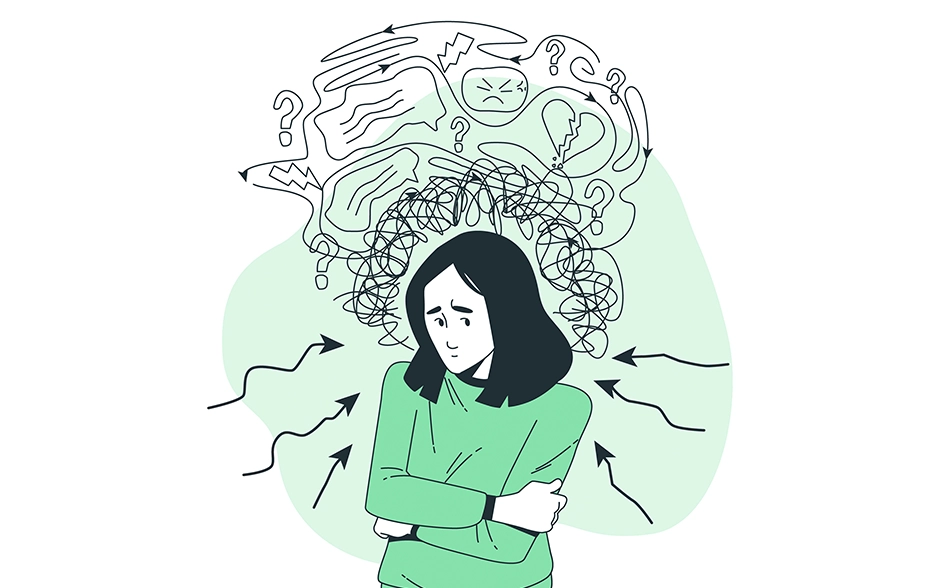When it comes to mental health, half the battle is fighting the misinformation around it. From WhatsApp forwards to casual conversations, myths about disorders like anxiety, depression, OCD, trauma, and even sleep issues are everywhere. These false beliefs not only confuse people; they delay treatment and add stigma.
This blog will help in breaking down 13 common myths around different mental health issues and help you get to the real truth. If you or a loved one are struggling, know that help exists and healing is very possible.
Reality: Anxiety is not a personality flaw or a simple case of ‘thinking too much.’ It’s a clinical condition that can affect sleep, appetite, focus, and even cause physical symptoms like palpitations and breathlessness. Real anxiety needs real tools, therapy, breathing techniques, and sometimes medication.
Reality: Depression is not laziness. It’s a chemical, emotional, and physical low that can paralyze a person from inside. Even getting out of bed or replying to a text can feel like climbing Everest. Depression treatment includes therapy, lifestyle changes, and sometimes antidepressants.
Reality: While stress is part of modern life, chronic stress or burnout can lead to serious breakdowns-emotionally, mentally, and physically. Burnout is recognized by WHO as an occupational syndrome. You don’t have to crash to justify care.
Reality: Obsessive Compulsive Disorder isn’t about liking clean rooms. It involves distressing, uncontrollable thoughts (obsessions) and repetitive actions (compulsions) done to ease anxiety. It can be debilitating, not quirky.
Reality: Trauma can come from neglect, bullying, betrayal, breakups, or even witnessing distressing events. It’s not about how “bad” something is, but how your nervous system processes it. Trauma therapy helps rewire the brain safely.
Reality: Porn addiction can affect dopamine levels, self-esteem, relationships, and even sexual health. Like any behavioral addiction, it needs structured intervention, not just shame or guilt.
Reality: Chronic anger can stem from childhood trauma, unmet emotional needs, or mental health disorders. It’s not always about “control”, sometimes it’s about learning new emotional tools and letting go of internal pain.
Reality: Sleep struggles can be linked to anxiety, depression, trauma, even hormone imbalances. While sleep hygiene helps, many people need CBT-i therapy, guided meditations, or professional support.
Reality: Panic attacks are real, scary, and overwhelming. They involve sudden surges of fear that feel like heart attacks. They’re not a weakness; they’re often signs of underlying anxiety that need attention.
Reality: Narcissistic Personality Disorder (NPD) is rooted in deep insecurity and lack of empathy. It’s not just confidence or arrogance; it’s a clinical personality disorder with patterns of behaviour that affect relationships deeply.
Reality: This myth stigmatizes millions. Borderline, avoidant, dependent, and other personality disorders can lead to intense emotions and unstable relationships but not violence. With therapy (especially DBT), people can lead healthy lives.
Reality: Eating disorders are about control, body dysmorphia, trauma, and mental health and not vanity. People with anorexia or bulimia suffer from intense fear of weight gain and distorted self-image. Treatment often needs therapy, medical care, and nutrition support.
Reality: Schizophrenia is about hallucinations, delusions, and distorted thinking. It’s not a split personality (that’s Dissociative Identity Disorder). With treatment, many people with schizophrenia live stable, fulfilling lives.
Mental health disorders are real, complex, and treatable. No two people experience them the same way and there’s no shame in seeking help.
At Veda Rehab and Wellness, we specialize in treating a wide range of conditions including:
Luxury and privacy: Celebrities and professionals trust us for discreet, world-class care
Holistic healing: Therapy, yoga, nutrition, mindfulness, and family support
Short programs available: 1-day, 10-day detox and full residential care
Voluntary treatment programs
Green spaces in Mumbai, Delhi & Bangalore: A rare find in these metros
Work-friendly rehab: Use your phone and laptop if needed
Gourmet meals, entertainment, and personalized plans
If you’re still unsure about what you or your loved one is going through, start with one step, learning the truth.
